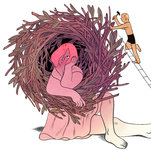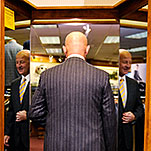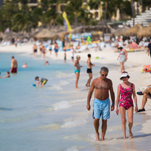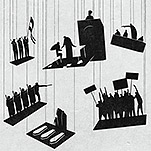RIO DE JANEIRO — I flew to Brazil from Dubai, a 15-hour nonstop flight favored by Chinese businessmen pursuing investments in South America. Most days there are two packed flights, one to Rio and one to São Paulo. They connect hubs of an emergent world to which the United States is peripheral.
Op-Ed Columnist
The Post-American Mall
By ROGER COHEN
Published: November 4, 2013
Connect With Us on Twitter
For Op-Ed, follow @nytopinion and to hear from the editorial page editor, Andrew Rosenthal, follow @andyrNYT.
Dubai airport at 6 in the morning is a terrifying sight, a vast brand-filled mall thronging with thousands of shoppers from China, India, Russia, Africa and sundry other parts of the world that have been enjoying rapid growth over the past decade as the West languished. By comparison with this giant glittering hall of temptation, where the newly affluent scramble to shop until they drop, New York’s Kennedy airport appears tawdry. Even Amsterdam’s Schiphol looks like a rookie.
Then there are the banners boasting of Dubai’s development. You learn that in 1991 Dubai had one skyscraper and now it has more than 900. You learn that Dubai holds 59 world records (one must be for the intensity of the shopping experience at dawn). You learn that the world’s tallest building, the Burj Khalifa tower, is twice the height of the Empire State building. You enter a huge mall and learn that an even bigger one, the Mall of Arabia, is being built. You find a room on the 63rd floor of a hotel and gaze out on a vast construction site, more high-rises popping up like mushrooms. A new port is being built.
Everything is the biggest, the best and the brightest. Trees are festooned with lights. Even the streets shine.
In Brazil, awaiting the World Cup and the Olympics over the next three years, the atmosphere is a little less heady. A real estate boom (some say bubble) has reached unprecedented levels; unemployment is low; vast new reserves of oil promise buckets of cash; and a middle class with greater access to credit than ever before continues to grow. But there is a new undercurrent of unease.
On one level, the disquiet is about economic management. Growth has slowed dramatically. Public debt has risen. Inflation stirs.
But at a deeper level it is cultural, as if the recent street protests have suddenly awoken Brazilians to the fact that their rush for affluence over the past decade — all the credit-driven car buying, the acquisition of apartments and the conspicuous consumption — has masked fundamental problems of skewed development, violence and corruption that have now emerged once again into plain sight. In no other nation is life so cheap just beneath the soft and seductive surface.
Fernando Henrique Cardoso, the former president who tamed inflation and through stability coaxed Brazil’s always elusive golden future toward the present, put the situation this way in an article in the Globo newspaper:
“There is a widespread discomfort, principally in big cities, that has emerged as the product of an insensitive occupation of urban space with little or no infrastructure and a low quality of life for a fast-growing population. Chaotic access to transport, deficient water supply, and poor services (education, health and security) fall well short of people’s growing demands.”
Over the past weeks newspaper headlines have dwelled on resurgent violence in the state of Rio de Janeiro. The police response is often ruthless. In 2012, police killed 415 people in Rio and 563 in São Paulo, Globo reported, and in the country as a whole they killed an average of five Brazilians a day. The rate of deaths at the hands of the police is several times that in the United States or Britain.
An executive working for a multinational gave me an account of the extortion he faces at a plant providing raw materials for Rio’s elaborate port renovation project. Leaders of the nearby favela, or slum, threatened the plant manager at gunpoint after he revealed a scam skimming cash at several stages of the production process. The situation only calmed down after the manager was removed and the company agreed to deliver truckloads of bricks to the favela bosses.
These trade-offs happen everywhere, the ugly backdrop to the beauty of Rio and its plans to become yet more “maravilhosa,” or wondrous. They encumber and distort Brazil’s development. It does not help that the response of the government of President Dilma Rousseff to its critics is often to label them as rightist stooges or even fascists.
In both Dubai and Brazil two characteristics of the emergent world struck me: growing intolerance of critics and a fierce devotion to money, preferably earned fast and granting access to the exclusive clubs of the privileged. This is the new money culture, if the word culture is not misplaced.
Tawdry they may be, and increasingly unequal, but the democracies of the West with their rule of law and culture of debate can look attractive from afar.












